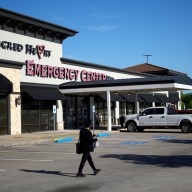You never know when they might give key info
After giving birth, friends and family present can help you, nurses or other staff by providing key information at crucial times, says our columnist.
I’ve kept it no secret from readers that I was recently pregnant. And, not wishing to keep any of you who cared in suspense, I’ve had my baby.
Once again, a few days spent in hospital gave me time to think — and issues to think about.
In a ward where all the nurses are women, and all the patients are women (infants not included), you’d think that everything would run smoothly.
Not so.
I’m not complaining about my treatment, any nurse in particular or the hospital itself. Rather, the experience opened my eyes even more to how everyone, women and men, really have to be proactive and speak up when it comes to your health and being involved in the health care system. More importantly, it’s imperative to have an advocate by your side at all times, especially if you’re in a situation where you may not be thinking clearly.
Did you get that? I can tell you nothing more crucial to your well-being than this: Make sure a relative, close friend or someone who knows you well hangs around when you’re in hospital and pays attention to your treatment and medication.
Example: Post-delivery, I had a negative reaction to the spinal anaesthesia. The nurse administered an anti-itch drug which made me quite sleepy, but it wasn’t enough. She ordered an increased dosage.
Another nurse prepared to inject this into my I.V., but I asked my mom to ask the nurse what she was doing. Good thing I did as she was about to dose me up with something to relieve nausea — not the itch! — and she admitted it was the wrong drug.
This particular situation wasn’t life threatening. However, it could have been dangerous had I been allergic to the second drug.
The scary reality is that you can never let your guard down — not even right after delivering a baby.
Another example: One morning, just before the nurses switched shifts, my night nurse brought me two painkillers. Less than an hour later, the day nurse brought me the same pills. Certain I had just taken them, I told her so. She checked her papers, didn’t see any record of it, and insisted I take them.
Luckily, my husband was there, backed me up, and we compromised on one painkiller. I knew that one extra wouldn’t cause me harm if I had been right, and I also wouldn’t be in too much pain if I was wrong.
But again, what if I wasn’t aware?
So, take my advice: Should you need to go to the doctor for anything more than a routine checkup, bring someone along with you and take notes. Remember, your health is ultimately your responsibility, so be alert and self-protective.















